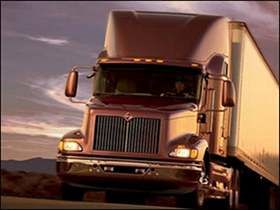Can’t Find A Job After Being Terminated From Schneider
Topic 32966 | Page 2

I was terminated for three minor incidents in one year, I was devastated but kept applying and was hired for a local Pepsi delivery driver. I was also hired by another OTR company in Denver but declined after the offer at Pepsi. Physical job but I am home every day and the pay is good. Keep applying and somebody will give you a second chance!
OTR:
Over The Road
OTR driving normally means you'll be hauling freight to various customers throughout your company's hauling region. It often entails being gone from home for two to three weeks at a time.

This is an interesting discussion. If I’m understanding G Town correctly, there are two types of high hooks. I didn’t know this previously, but now I know.
I think that with time, many drivers lose their fear of a high hook. A high hook where the king pin goes completely over the 5th wheel can be costly in terms of both time and money to get out of.
I have been in several situations where I would have high hooked if I didn’t GOAL before finishing the backing-in process. But I regularly see drivers back up to trailers and slam in without ever doing a GOAL. Very risky.
I'm not an anal person and pretty disorganized in general. However I'm extremely anal about checking my fifth wheel.
I pick up trailers from a company drop yard that is a complete nightmare in the winter. Question is how dangerous is it to move somewhere to solid ground when you haven't fully connected and you can see your locking jaws haven't "fully" latched? Pin is half way in and you can see half an inch of the clean locking jaw.
Question is how dangerous is it to move somewhere to solid ground when you haven't fully connected and you can see your locking jaws haven't "fully" latched?
It's very dangerous and consequential. You can have a roll over accident, there's the possibility of the trailer rolling away because it still has air in it, the glad hand can snap off and go flying. You never know until it's too late.
If you can't move the equipment, don't move it. You're better off inconveniencing somebody than being in the position of the OP.
I'm not sure what you mean by "complete nightmare", but there are still proper ways of doing these things without the risk.

3+ inches of mud, compacted snow and ice. Trailers usually have a slant to them. Lately there has been no room, been dropping these in tractor and even car parking spots. Last couple times I've beat my relay by an hour and just had him drop it in the mud, at least its level and not on uneven snow/ice and I got a clean hook.
When I was taking them from the DC I witnessed a couple guys drop their trailers. Managers just scramble and cover it up. But yeah a little different when youre out on the road and have to call SEM. lol.
Question is how dangerous is it to move somewhere to solid ground when you haven't fully connected and you can see your locking jaws haven't "fully" latched?
It's very dangerous and consequential. You can have a roll over accident, there's the possibility of the trailer rolling away because it still has air in it, the glad hand can snap off and go flying. You never know until it's too late.
If you can't move the equipment, don't move it. You're better off inconveniencing somebody than being in the position of the OP.
I'm not sure what you mean by "complete nightmare", but there are still proper ways of doing these things without the risk.
When I'm hooking to a trailer that is leaning due to compacted snow and ice I'll back in and get my 5th wheel under it, before hooking get out and raise the landing gear until BOTH sides are raised slightly off the ground and all the weight is on my 5th wheel. I do this anytime I'm hooking to a trailer actually. It's best to get out to visually check the height anyways so I'll give it a couple cranks. I've seen a few guys drop trailers that they swear were hooked. In 5 1/2 years trucking I've never dropped one and don't plan to start now. Some may say it's overkill but i feel the few seconds extra is worth knowing for sure it's hooked correctly.
Company policy is to leave landing gear roughly 2 inches off the ground, and drop airbags to get out from under it. Some people don't do it, and our internationals and freightliners sit lower than the volvos so even if someone does it correctly the height may be too high.
OWI:
Operating While Intoxicated
New Reply:
New! Check out our help videos for a better understanding of our forum features

















Preview:








 TT On Facebook
TT On Facebook
Alex, I didn’t mean that was necessarily your only option but it may be a stop gap solution for you for a while.
There are drivers who have had roll overs and are still driving. It just means that it will probably take some time and lots of steady effort from you to get back in the saddle. But you can do it if you are motivated enough.
CDL:
Commercial Driver's License (CDL)
A CDL is required to drive any of the following vehicles: